

 |
 |
||||
| Home | Reviews | Extras | Forums |
|
PonyoSynopsisAn imaginative young boy named Sosuke lives in a small seaport in Japan with his mother (his father's a sea captain and rarely around). Out in the ocean, a sorcerer named Fujimoto, who used to be human, lives with his daughter Brumhilde, a goldfish-like being, and her younger sisters; one day, on an outing with them in his submarine, she sneaks off to explore and ends up getting stuck in a discarded glass jar and being washed up on a beach where Sosuke is playing. Sosuke saves her by putting her in a bucket and names her "Ponyo"; she licks a cut on his finger that he'd gotten from breaking the jar, healing it almost right away. Just as she's starting to learn more about people, though, a paranoid and distraught Fujimoto calls her back using wave spirits. That day, an angry Ponyo, who now refuses to go by her previous name, uses her magic and the blood she'd eaten to escape her father's house and turn into a human; the sheer amount of magic she releases into the ocean, in doing this, makes a crack in an ancient spell and puts the world in danger, generating ridiculously high tides in the process. She goes to find Sosuke, who's amazed and overjoyed to see her. The two soon realize, though, that they have to somehow put things back the way the are before the world is flooded over. ReviewHayao Miyazaki's Ponyo, if nothing else, is proof to me that the man is as much of a cinematic painter as a movie director. This movie stands out from his others in that the conservationist themes and dramatic fantasy step into the background a little bit; the flying sequences of Nausicaa and Laputa: Castle in the Sky and the dark mystery of Spirited Away give way to what, instead, feels more like a mellow tone poem. Ponyo is slow, simple, and laid-back, and it flourishes on its own atmosphere and beauty. In fact, the movie really only manages to lose itself when it breaks its own leisurely pace and tries to be dramatic; the story itself has some flaws, and when it takes itself too seriously, that gets a bit more obvious. Still, it's a movie about the glory of the world seen through the eyes of inquisitive children, and it captures that feeling very well: it's a slow journey that's a lot like a boat ride on a calm sea. 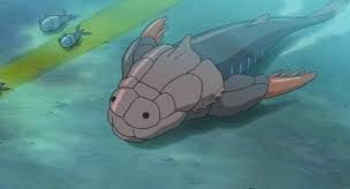 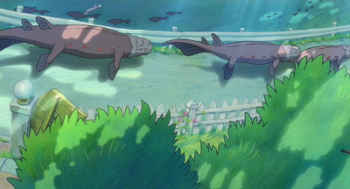 And Ponyo has a perfectly decent story, but not one that's as thematically rich as, say, Spirited Away, which you could pick apart for hours. Instead, it's a showcase of vivid displays of imagination, and it's like a lot of slice-of-life anime in that the characters, atmosphere, and visuals matter more than the narrative itself; I think that Yokohama Shopping Trip might be a good comparison. The story's a loose modern interpretation of Hans Christian Anderson's The Little Mermaid, but you'd be forgiven for not picking up on that, and it feels a bit thin, at times. Fujimoto, like most Miyazaki "villains", is a complex figure who resents humans for being arrogant about their place in nature and making a mess of the planet's oceans, but he's more a paranoid, overprotective father figure than anything. As soon as you realize that his powers don't anywhere near compare to his wife, who brings about the deus ex machina of the ending, he feels more goofy than anything, and since he's the only one spouting conservationist rhetoric in this movie (the humans in this particular town seem to already appreciate that plenty, he comes across as just a bit of a crotchety, preachy crank. And the ending really is a bit nonsensical and over-conveniently wrapped up; I guess it makes sense to me that Ponyo using her powers inappropriately screws up the world's balance, but it's not really elaborated upon, and given how it ends, there's not really any real effective drama to it. Basically, the plot is not why I love this movie. No, what actually makes Ponyo special is the expansiveness of imagination and the depth of the look we get into the beautiful world it paints, and the glimpse into the daily lives of the people who live in that world. The swarms of sea creatures, the roaring waves that turn into schools of barracuda and back as they crash, the gently waving trees, the flooded sidewalks and roads full of prehistoric fish...that atmosphere, this world that it paints, that's what makes this movie as wonderful as it is. Miyazaki, the storyboard artists, and the animators give such a spark to this that you feel like you've stepped into a real place, and you want to be there eating ham and eggs with Ponyo, Sosuke, and his mother (Ghibli food porn is very much a thing). The colorful, earthy palette of tones suits the movie well, and Joe Hisaishi, as usual, does an amazing job with the score; I'd recommend watching this with a good speaker system, and I'm really happy I got to see this in theaters. Even with the awkward drama, it's a movie where I didn't felt like any of the time was wasted; there was always something to look at and take in, whether it's the eels and Devonian fish swimming around in the background, Fujimoto's bizarre, hippyish clothes and decor, or just the ocean vistas themselves. 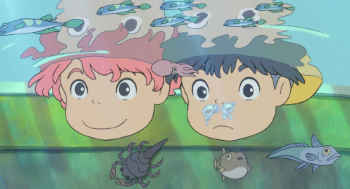 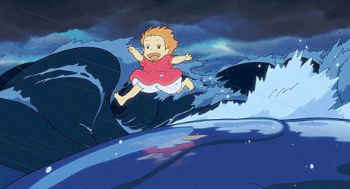 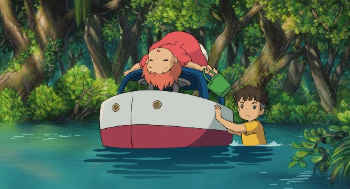 And the gorgeous art won't stand on its own if the setting itself doesn't resonate or if you don't care about the people, but Ponyo does amazingly in that regard. You really do end up feeling like you know and live with these people in their cute little town, at the end, whether it's the spunky old ladies (one of my favorite things about Miyazaki movies) or inquisitive kids like Sosuke and Ponyo who can just freely wander about town and explore the way they do. or Sosuke's snarky but good-hearted mother, Lisa; they're all the kinds of people that make life a lot more fun, and you think "this might be a good place to live" when you meet them. And this really is a movie seen from a child's eyes: Lisa's half-joking, half genuine affectionate acceptance of Sosuke's wild stories, their adventures wandering the town in a (magically) oversized tugboat toy, the old ladies literally leaping out of their wheelchairs after being overwhelmed by the magic and the giant fish. There's just this sense that this is a nurturing place for a child to be, overall, and somehow I felt calmed down and happy after watching this. Ponyo really isn't a movie that's meant to be philosophical or "deep," which was a big disappointment to some of his long-time fans, but I'd actually say it's almost better that way, and it shows that he knows how to make a movie for kids that doesn't feel like it's pandering, condescending, or attracting their attention with cheap thrills; honestly, the movie only gets at its weakest when it tries to be dramatic and serious. I think if this had come out when I was a little girl (I was a teenager when I saw it), it'd be up there alongside Kiki' Delivery Service as a childhood favorite, even if it's not quite as amazing as that movie. It's an experiential work in the same way that you sort of sit and take in a series like Aria or Yokohama Shopping Trip: if anything, Ponyo, which has some of the most beautiful art and soundtrack work I've ever seen, is even more vividly tactile and sensory. 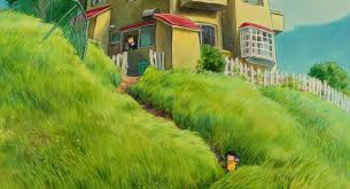 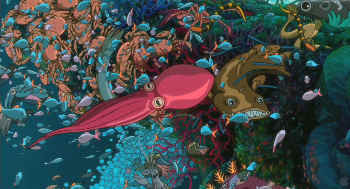 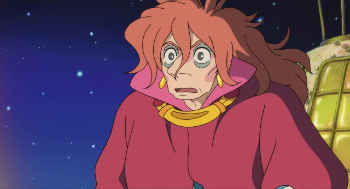 Ponyo doesn't have the flair of Miyazaki's other works, and it may never be a classic, especially in the US, because stuff like this doesn't have much of an adult market at all, and it's a very different type of kids movie that might be a hard sell; I actually wonder that if this hadn't already had Miyazaki's name recognition, it might never have been licensed. But it has a joy of its own that's best experienced, not read about, and I'm not going to be able to convey it with this review, by itself. The atmosphere might not appeal to everybody, and since that's so crucial to the film, I'll acknowledge that this movie could be a bit polarizing. In my opinion, it's best when it's talking about nothing and moving along leisurely, and at its worst when it's trying too hard to make a point, and I think that Miyazaki just might have had a hard time adjusting his style so abruptly after putting out Howl's Moving Castle and Spirited Away right before this (he was apparently trying to challenge himself, and he forced himself to not using any CGI for this movie, also). Even with this issue, Ponyo's a joy to watch: it's a fascinating and vibrant movie that made me wish I was there with the kids, swimming with ancient fish in a flooded town. And that's a beautiful thing. I gave this five stars when I first wrote this review, but I think there's enough problems with the plot that this isn't up there with stuff like Spirited Away or Kiki as far as Miyazaki movies go. It's still a bit of a personal favorite, so consider this about as strong a four stars as I can give. — Nicoletta Christina Browne Recommended Audience: This is, truly, a children's movie, but it's more than adequately interesting and intelligent for adults. Those cynical teenagers who roll their eyes at such "childish" entertainment will be missing out. Version(s) Viewed: R1 DVD (Japanese with English Subtitles) Review Status: Full (1/1) Ponyo © 2008 Hayao Miyazaki/Studio Ghibli |
 |
|
| © 1996-2015 THEM Anime Reviews. All rights reserved. |